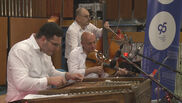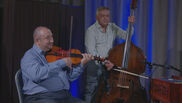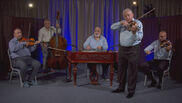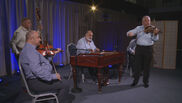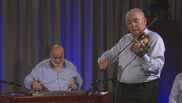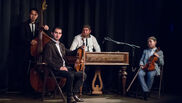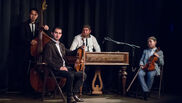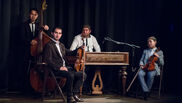The Sendreis Gypsy Band - I Asked for It
created: 18. 06. 2025 15:51 modified: 23. 06. 2025 10:26
The founders of the Sendreiovci Gypsy Band are Vladimír Sendrei and his wife Jana Sendreiová. They founded the Band in 2001 in the village of Kokava nad Rimavicou, the band's original name was Kokavakere lavutara. Their work caught the attention of film music composer Hans Zimmer and became part of the soundtrack of the film Sherlock Holmes: A Game of Shadows. The Band's music also enriched the soundtrack of the Czech film titled Roming.
Jana Sendreiová achieved her personal success when in 2005 she performed together with other soloists at a concert in New York at Carnegie Hall, accompanied by the Roma band Anyalai Gypsy Band.
The song I Asked for It was presented on 9.4.2024 during an event from the Live Books series, which took place on the occasion of World Roma Day at RTVS, the Big Studio of Slovak Radio in Košice.
category: music
tags: instrumental modern folk orchestra borrowed Romani Sendreiovci Gypsy Band general audience internal
Peter Balogh Orchestra Hallelujah to You
created: 30. 04. 2025 13:37 modified: 30. 04. 2025 13:43
Peter Balogh Orchestra is a musical ensemble founded in 2017, founded and artistic director is violinist Peter Balogh Sr. The members of the orchestra are from Slovakia and Hungary, they perform not only in Slovakia, but also in various countries of Europe and Asia. The orchestra's repertoire includes a wide range of genres, but mainly film music, operetta, jazz, Slovak and Hungarian folklore and so-called evergreens.
The composition February Love was composed by the Hungarian composer and violinist Járóka Sándor Jr. The instrumental composition presents a strong violin solo and the elements of Romani music characteristic of Hungary. The piece is popular for its emotional melody and virtuoso violin passages.
The recording was made on August 16, 2023 in M Arena in Prešov, it is part of the documentation of Roma cimbalom bands within the framework of DICRK activities.
Instruments and cast:
Peter Balogh Sr. - violin, the lead violin
Peter Balogh Jr. - the second violin
Jónás Géze - cimbalom
Bakoš Kálmán - viola
Sarközy Pál - double bass
category: music
tags: instrumental modern folk borrowed Peter Balogh Orchestra general audience internal
Peter Balogh Orchestra I Have a Hat with a Green Ribbon
created: 30. 04. 2025 11:48 modified: 30. 04. 2025 11:48
Peter Balogh Orchestra is a musical ensemble founded in 2017, founded and artistic director is violinist Peter Balogh Sr. The members of the orchestra are from Slovakia and Hungary, they perform not only in Slovakia, but also in various countries of Europe and Asia. The orchestra's repertoire includes a wide range of genres, but mainly film music, operetta, jazz, Slovak and Hungarian folklore and so-called evergreens.
The composition February Love was composed by the Hungarian composer and violinist Járóka Sándor Jr. The instrumental composition presents a strong violin solo and the elements of Romani music characteristic of Hungary. The piece is popular for its emotional melody and virtuoso violin passages.
The recording was made on August 16, 2023 in M Arena in Prešov, it is part of the documentation of Roma cimbalom bands within the framework of DICRK activities.
Instruments and cast:
Peter Balogh Sr. - violin, the lead violin
Peter Balogh Jr. - the second violin
Jónás Géze - cimbalom
Bakoš Kálmán - viola
Sarközy Pál - double bass
category: music
tags: instrumental modern folk borrowed Peter Balogh Orchestra general audience internal
Peter Balogh Orchestra My Dear Mother Advised Me Greatly There is no Better Musician
created: 30. 04. 2025 11:30 modified: 02. 05. 2025 13:33
Peter Balogh Orchestra is a musical ensemble founded in 2017, founded and artistic director is violinist Peter Balogh Sr. The members of the orchestra are from Slovakia and Hungary, they perform not only in Slovakia, but also in various countries of Europe and Asia. The orchestra's repertoire includes a wide range of genres, but mainly film music, operetta, jazz, Slovak and Hungarian folklore and so-called evergreens.
The composition February Love was composed by the Hungarian composer and violinist Járóka Sándor Jr. The instrumental composition presents a strong violin solo and the elements of Romani music characteristic of Hungary. The piece is popular for its emotional melody and virtuoso violin passages.
The recording was made on August 16, 2023 in M Arena in Prešov, it is part of the documentation of Roma cimbalom bands within the framework of DICRK activities.
Instruments and cast:
Peter Balogh Sr. - violin, the lead violin
Peter Balogh Jr. - the second violin
Jónás Géze - cimbalom
Bakoš Kálmán - viola
Sarközy Pál - double bass
category: music
tags: instrumental modern folk borrowed Peter Balogh Orchestra general audience internal
Peter Balogh Orchestra God punishes
created: 29. 04. 2025 09:49 modified: 29. 04. 2025 09:56
Peter Balogh Orchestra is a musical ensemble founded in 2017, founded and artistic director is violinist Peter Balogh Sr. The members of the orchestra are from Slovakia and Hungary, they perform not only in Slovakia, but also in various countries of Europe and Asia. The orchestra's repertoire includes a wide range of genres, but mainly film music, operetta, jazz, Slovak and Hungarian folklore and so-called evergreens.
The composition February Love was composed by the Hungarian composer and violinist Járóka Sándor Jr. The instrumental composition presents a strong violin solo and the elements of Romani music characteristic of Hungary. The piece is popular for its emotional melody and virtuoso violin passages.
The recording was made on August 16, 2023 in M Arena in Prešov, it is part of the documentation of Roma cimbalom bands within the framework of DICRK activities.
Instruments and cast:
Peter Balogh Sr. - violin, the lead violin
Peter Balogh Jr. - the second violin
Jónás Géze - cimbalom
Bakoš Kálmán - viola
Sarközy Pál - double bass
category: music
tags: instrumental modern orchestra folk borrowed Peter Balogh Orchestra general audience internal
Peter Balogh Orchestra I Lost Al
created: 29. 04. 2025 09:40 modified: 29. 04. 2025 09:56
Peter Balogh Orchestra is a musical ensemble founded in 2017, founded and artistic director is violinist Peter Balogh Sr. The members of the orchestra are from Slovakia and Hungary, they perform not only in Slovakia, but also in various countries of Europe and Asia. The orchestra's repertoire includes a wide range of genres, but mainly film music, operetta, jazz, Slovak and Hungarian folklore and so-called evergreens.
The composition February Love was composed by the Hungarian composer and violinist Járóka Sándor Jr. The instrumental composition presents a strong violin solo and the elements of Romani music characteristic of Hungary. The piece is popular for its emotional melody and virtuoso violin passages.
The recording was made on August 16, 2023 in M Arena in Prešov, it is part of the documentation of Roma cimbalom bands within the framework of DICRK activities.
Instruments and cast:
Peter Balogh Sr. - violin, the lead violin
Peter Balogh Jr. - the second violin
Jónás Géze - cimbalom
Bakoš Kálmán - viola
Sarközy Pál - double bass
category: music
tags: instrumental modern orchestra folk borrowed Peter Balogh Orchestra general audience internal
Peter Balogh Orchestra February Love
created: 28. 04. 2025 11:40 modified: 28. 04. 2025 13:45
Peter Balogh Orchestra is a musical ensemble founded in 2017, founded and artistic director is violinist Peter Balogh Sr. The members of the orchestra are from Slovakia and Hungary, they perform not only in Slovakia, but also in various countries of Europe and Asia. The orchestra's repertoire includes a wide range of genres, but mainly film music, operetta, jazz, Slovak and Hungarian folklore and so-called evergreens.
The composition February Love was composed by the Hungarian composer and violinist Járóka Sándor Jr. The instrumental composition presents a strong violin solo and the elements of Romani music characteristic of Hungary. The piece is popular for its emotional melody and virtuoso violin passages.
The recording was made on August 16, 2023 in M Arena in Prešov, it is part of the documentation of Roma cimbalom bands within the framework of DICRK activities.
Instruments and cast:
Peter Balogh Sr. - violin, the lead violin
Peter Balogh Jr. - the second violin
Jónás Géze - cimbalom
Bakoš Kálmán - viola
Sarközy Pál - double bass
category: music
tags: instrumental modern orchestra folk borrowed Peter Balogh Orchestra general audience internal
Living Book Holocaust Ďusi Band Jewish Songs
created: 12. 01. 2024 10:30 modified: 12. 01. 2024 10:34
The family band called Ďusi Band consists of Július Bandy Sr. and his three sons Kristián, Július, and the youngest Samuel. The cimbalom band from Prešov presents the best tradition of the Romani cimbalom groups with the high interpretive art of their members as well as the scope and genre richness of their repertoire. It consists of folklore typically Romani but also Slovak and other nations‘ and nationalities‘, the band also plays classical music and does well in playing music of the genres such as jazz, pop or film tunes.
The performance of two Jewish melodies (the first with unknown name and origin, the second named Foolisch Freilich Dance) was recorded during the Living Book on the Holocaust event, in Prešov, on September 27, 2018.
Musical instruments and musicians who play them
Violin (primas) - Samuel Bandy
Double bass - Július Bandy Jr.
Viola - Kristián Bandy
Dulcimer - Julius Bandy Sr.
category: music
tags: instrumental modern folk quartet borrowed Ďusi Band general audience internal
Yiddish Czardasz Czardas A Moll Dusi Band
created: 12. 01. 2024 08:14 modified: 12. 01. 2024 08:16
Roma Holocaust in Prešov, September 27, 2018.
The family band called Ďusi Band consists of Július Bandy Sr. and his three sons Kristián, Július, and the youngest Samuel. The cimbalom band from Prešov presents the best tradition of the Romani cimbalom groups with the high interpretive art of their members as well as the scope and genre richness of their repertoire. It consists of folklore typically Romani but also Slovak and other nations‘ and nationalities‘, the band also plays classical music and does well in playing music of the genres such as jazz, pop or film tunes. The video was recorded during the Living Book on the Holocaust event, in Prešov, on September 27, 2018.
Musical instruments and musicians who play them
Violin (primas) - Samuel Bandy
Double bass - Július Bandy Jr.
Viola - Kristián Bandy
Cimbalom - Julius Bandy Sr.
category: music
tags: instrumental modern folk quartet borrowed Ďusi Band general audience internal
Living Book Holocaust Ďusi band Hatikva (Jewish Anthem)
created: 27. 11. 2023 13:24 modified: 10. 01. 2024 11:09
Hatikva, Ha-Tikva — Israel's national anthem. Its lyrics express the hope of Jews to return to their country and their desire to live there in calm, peace and harmony (hatikva = hope in Hebrew). The lyrics was written in 1878 by Naftali Herz Imber (*1856, †1909) as poem, published in 1886 titled Tikvatenu (Our Hope). The author of melody is Samuel Cohen, the composer and immigrant from Moldova. He composed it as a popular Moldovan-Romanian folk melody, in which musical motifs from The Vltava, a composition which is a part of music cycle My Homeland by Bedrich Smetana. In time of 7th Zionist Congress in Basel (1905) it was already widely known and popular. Its status as the anthem of the Zionist movement was confirmed at the 18th Congres in Prague (1933). In 1948 it became the national anthem of the state Israel. In some communities, it is sung as the closing song of a thanksgiving service or after a meal.
The video is a recording of the instrumental interpretation of the song performed by the Roma band Ďusi Band.
The family band called Ďusi Band consists of Július Bandy Sr. and his three sons Kristián, Július, and the youngest Samuel. The cimbalom band from Prešov presents the best tradition of the Romani cimbalom groups with the high interpretive art of their members as well as the scope and genre richness of their repertoire. It consists of folklore typically Romani but also Slovak and other nations‘ and nationalities‘, the band also plays classical music and does well in playing music of the genres such as jazz, pop or film tunes. The Romani song Hatikvah in an instrumental version was recorded during the Living Book on the Holocaust event, in Prešov, on September 27, 2018.
Musical instruments and musicians who play them
Violin (primas) - Samuel Bandy
Double bass - Július Bandy Jr.
Viola - Kristián Bandy
Cimbalom - Julius Bandy Sr.
category: music
tags: instrumental modern folk quartet borrowed Ďusi Band general audience internal




